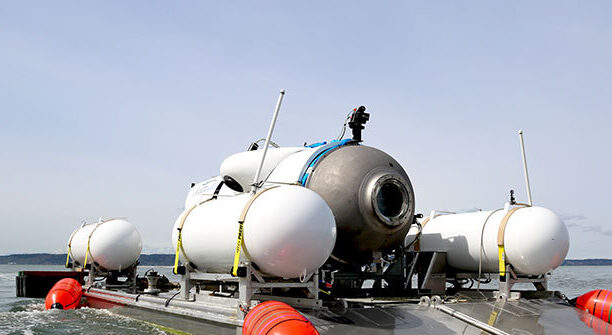Top News
Time’s Up: Titanic Sub Past 96-Hour Mark, Coastguard Says ‘Banging’ Noise is Just the Sea

The ‘banging’ detected by rescuers in the hunt for the missing Titan submarine appears to have been just “background ocean noise”, it is revealed as the craft passes the crucial 96-hour oxygen point on Thursday.
The U.S. Coast Guard Rear Admiral leading the response to the dissapearance of the submersible Titan off the wreckage of the RMS Titanic in the northwest Atlantic has dashed the hopes of many that the detection of a banging noice in the sea may lead rescuers to the stricken craft.
Speaking to Britain’s Sky News television channel, Rear Admiral John Mauger said that while the noises detected were still being analysed, it appeared that what had previously been characterised by banging as some was actually “background ocean noise”. The search was ongoing despite the analysis, the officer said, and that he was in contact with the families of those onboard.
British Billionaire Adventurer Among Those Missing on Titanic Submarinehttps://t.co/LgEsJqEGnL
— Breitbart London (@BreitbartLondon) June 20, 2023
The submersible Titan dived with two members of crew and three passengers in the early hours of Sunday morning and was due to stay underwater on a tour of the wreckage of the RMS Titanic until that afternoon. Approximately an hour and three quarters into the descent, the vessel lost contact with the surface and the alarm was raised later that day.
An international effort at locating the Titan is underway, with Canadian, U.S., French, and private ships and aircraft assisting with the increasingly urgent effort. Diving robots that can withstand the enormous pressure of the deep water around the Titanic wreck are also in use.
When the Titan departed its mothership, it was carrying approximately 96-hours of emergency oxygen onboard, a reserve which — at estimated usage — would have run out this morning. But as reported, the deadline is hard to accurately pin down as so much is unknown about the state of the craft, the health of those onboard, and how quickly they are consuming oxygen.
It may be the case, tragically, that the craft and all those onboard may have been destroyed instantly on Sunday if the Titan suffered a hull failure in the enromous pressure of the two-mile-deep waters around the Titanic. On the other hand an electrical failure may have deprived the craft of power and heating and hypothermia could leave the occupants unconcious but alive, and consequently using much less oxygen.
Just Hours of Oxygen Remain For Crew of Titanic Sub as More Ships Join Rescue Effort https://t.co/RXw7YVEiD5
— Breitbart London (@BreitbartLondon) June 22, 2023
Criticism of the submarine and the company that designed, built, and operated it has emerged during the search. The time it took between the submarine losing contact with the surface and the alarm being raised with the authorities has been questioned, as has the business ethos in OceanGate itself.
As also previously reported, CEO Stockton Rush had previously remarked that he prized the racial and other characteristics of would-be employees for the submarine companies over experience in the field.
Rush said in a now-unearthed interview that he didn’t want to hire experienced ex-military submariners because “50-year-old white guys” aren’t “inspirational” enough. He said: “When I started the business, old-timers in the industry told me I was nuts, and they continue to tell me that — partly because I said I was going to take inexperienced pilots in a submarine, in current, in zero visibility — and they thought I was insane”.
Instead, Stockton said, he was employing “very intelligent, motivated, younger individuals” instead.
Read the full article here


















